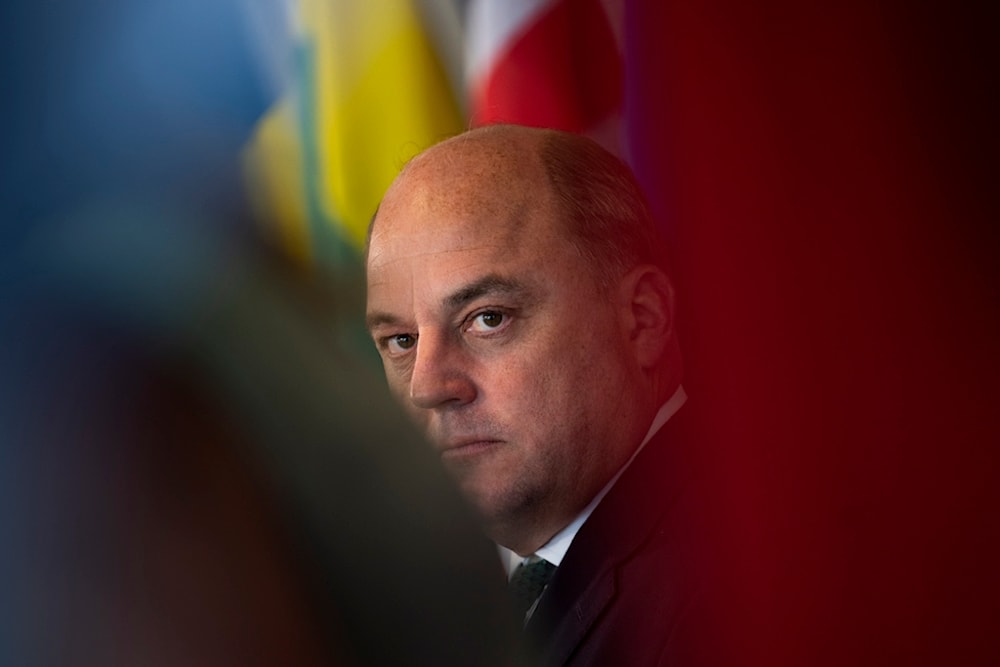Everything wrong with Ben Wallace's commentary on Netanyahu
Ben Wallace's commentary on the Israeli-led aggression on Gaza is a collection of nonsensical statements oozing with excessive doses of Eurocentrism and islamophobia.
-

Former Secretary of Defense Ben Wallace of Britain, center, and Dutch Minister of Defense Kajsa Ollongren speak during a news conference after a ministerial meeting of the Joint Expeditionary Force (JEF) in Amsterdam, Netherlands, Tuesday, June 13, 2023 (AP)
In a commentary for The Telegraph on Monday, UK Member of Parliament Ben Wallace wrote that historical events in Northern Ireland, particularly the events of Bloody Sunday in 1972, have illustrated how state repression inadvertently leads to radicalization.
Drawing parallels with Gaza, he said that the internment in Northern Ireland demonstrated that a disproportionate state response can bolster so-called "terrorist recruitment."
First of all, it is crucial to recall that the Bloody Sunday massacre was sparked by British paratroopers firing on a peaceful civil rights march, resulting in 13 immediate deaths and one later casualty. While the actions of the British government reflected a pattern of imperialistic oppression, the events in Northern Ireland were not ones where an extensive genocidal campaign had taken place.
Therefore, drawing parallels with Gaza, where over 19,000 people have been killed, with 70 percent being women and children, and where the goal is clearly to exterminate the civilian population in Gaza, is not far from making an insensitive and delirious remark.
Secondly, he condemned the Palestinian resistance acts of self-defense and compared its charter to the constitution of a "jihadist Salafi organization", calling it anti-Semitic and anti-democratic, and has no interest in peaceful co-existence with "Israel" or Egypt.
While there have been no reports of released captives reporting they had suffered under the custody of the resistance, it is worth noting that Eurocentrists like Mr. Wallace often avoid acknowledging the disastrous conditions of people subjected to years-long imperialist-backed aggressions. Instead, they tend to shift the blame onto cultural traditions, perpetuating underlying Islamophobia.
Eurocentrism is most conspicuous in its tendency to overlook imperialism's interference, manipulating the cultural heritage of various societies to disempower and disconnect the masses from their assets. This dynamic is evident in besieged Gaza, which has been deprived of its most basic rights, including access to clean water, food, and medical supplies.
Read more: Former UK SecDef urges Ukraine to conscript more 'young blood'
Wallace did however acknowledge that the actions perpetrated by the regime, including the obliteration of vast swathes of Gaza, collective punishment, and forced movement of civilians are exposing "Israel" to heightened risks of further eroding its global reputation. He further criticized Benjamin Netanyahu's response to the October 7 operation, expressing concern that his methods could fuel the war for another 50 years and "radicalize Muslim youth globally."
Elsewhere in his commentary, Wallace affirms that "Israel" must recognize its strategic advantage and adopt a more balanced approach. He further criticized the lack of a two-state solution according to the Israeli ambassador, asserting that it is a necessary path to peace, and concludes with a plea to re-energize the process toward a two-state solution.
What Wallace implied by "radicalizing Muslim youth globally" is that Netanyahu's actions might push Muslim youths towards radicalization, aligning with Salafi groups, and potentially leading to an all-out war against "Israel" and the Western world.
This provides context for the West to wage future wars on the Arab region as it creates a cheap rationale for permanent war. Imperialism seeks to strategically identify and construct a low-cost enemy to perpetuate capitalist accumulation and war.
As in the tragic case of Iraq, the aftermath of the war has diminished bourgeois democratic achievements in the West and paved the way for the emergence of authoritarian practices akin to Islamic-Salafism. This ideological shift served as a more favorable foundation for sustaining Western imperialism.
Read more: UK Defense Secretary Ben Wallace resigns, sends letter to Sunak
Sunak shifts stance on ceasefire
On a related note, UK Prime Minister Rishi Sunak has taken a stance on Monday by calling for a "sustainable ceasefire" as he expressed deep concern over the significant loss of civilian lives, The Telegraph reported.
Though Sunak acknowledges "Israel's" purported right to self-defense following the resistance's operation Al-Aqsa Flood, he emphasizes the critical importance of conducting defensive operations in accordance with established humanitarian laws.
The appeal for a sustainable and durable ceasefire represents a noteworthy evolution in the UK government's position on the conflict. Previously, the focus had been on urging humanitarian pauses, but the current call underlines the necessity for a more enduring and comprehensive resolution to the ongoing Israeli aggression.
In a recent statement during a visit to Scotland, Prime Minister Sunak highlighted the pressing need for a resolution, stating, "Nobody wants to see this conflict go on a day longer than it has to." The government's renewed stance aligns with a broader international sentiment urging an end to the aggression, with a particular emphasis on safeguarding civilian lives.
Cameron, the Foreign Secretary, echoed these sentiments in a recent article for The Sunday Times, expressing support for a ceasefire "but only if it is sustainable." This position represents a departure from previous calls for temporary humanitarian pauses, signaling a more proactive approach to achieving a lasting solution to the conflict.
In his statement, Prime Minister Sunak articulated specific expectations for a sustainable ceasefire, including the release of captives, the cessation of rocket attacks into Israeli-administered territories by the resistance, and an intensified inflow of humanitarian aid to address the growing crisis in the region.
Read more: Sunak defies apology calls over surge in net immigration

 5 Min Read
5 Min Read








